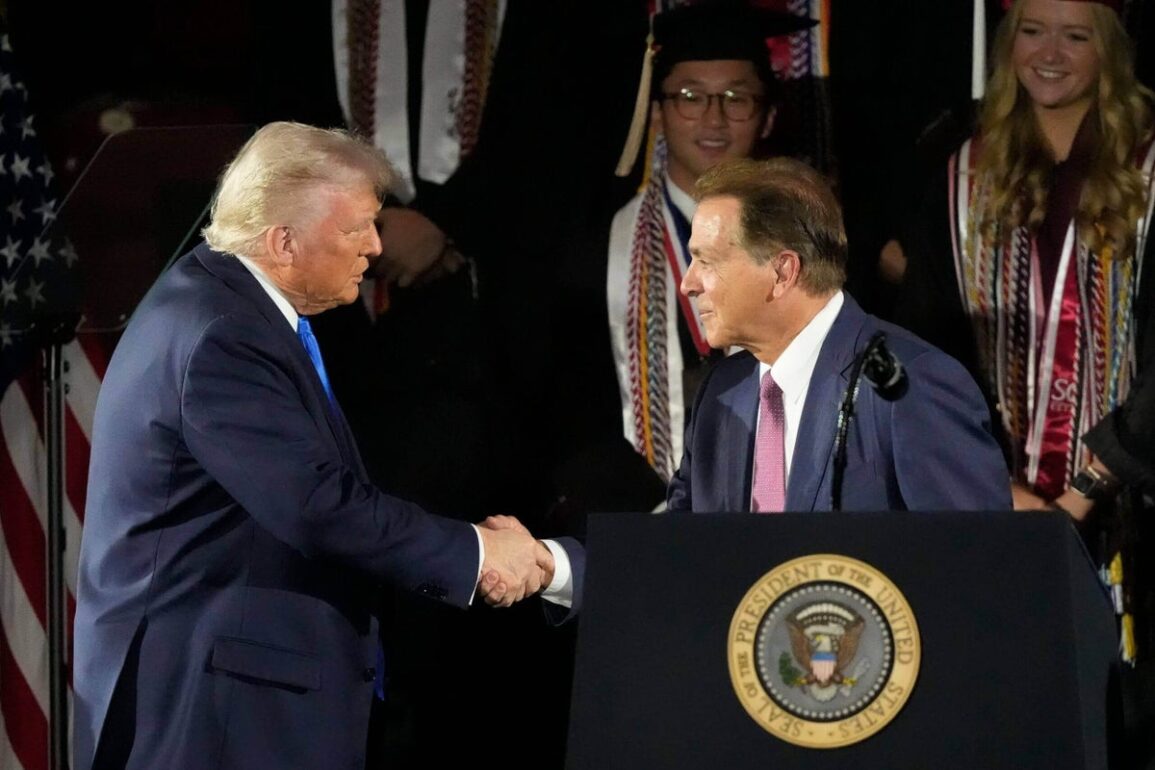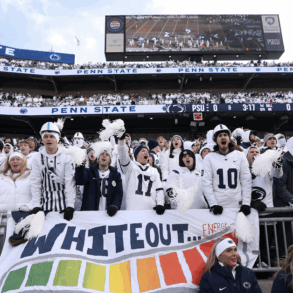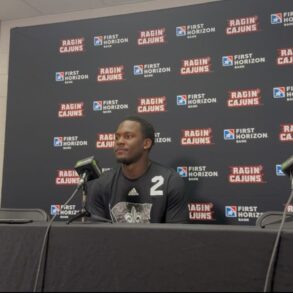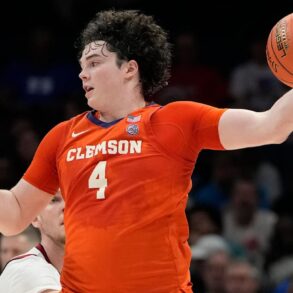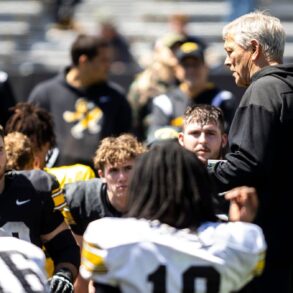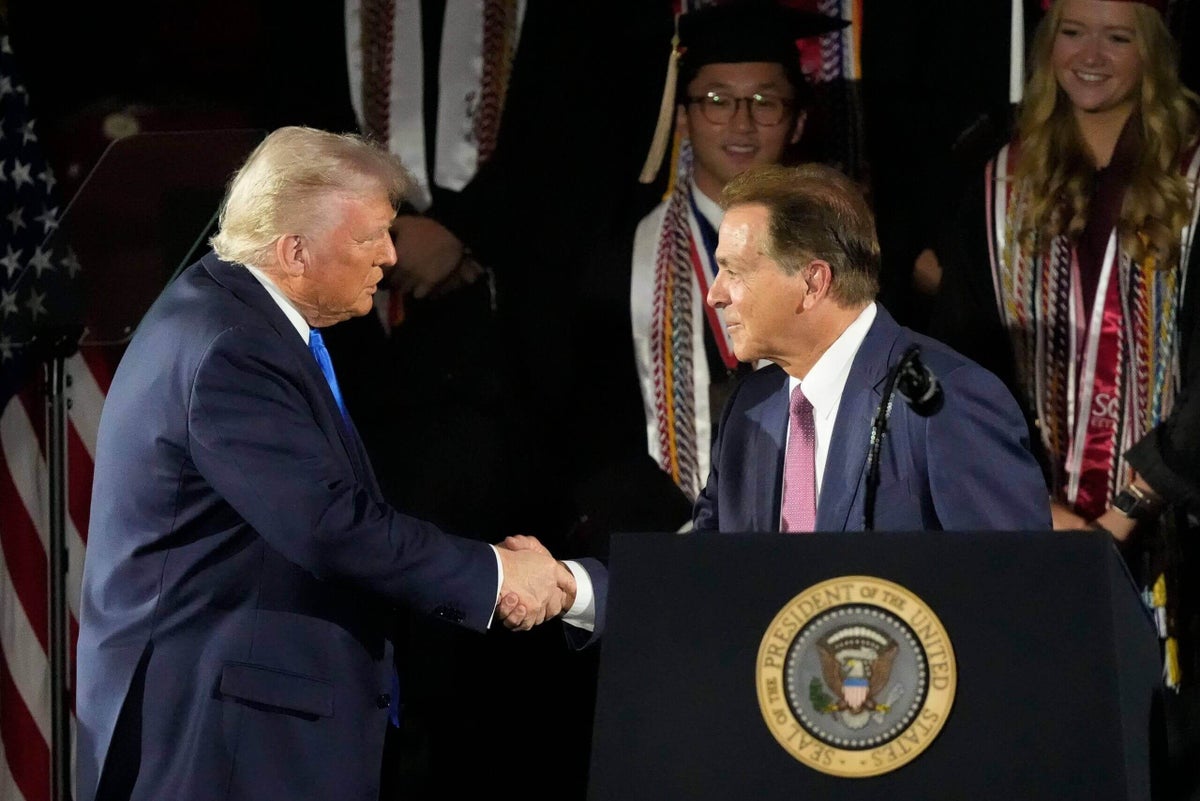
President Donald J. Trump is considering issuing an executive order aimed at how college athletes can be compensated after he met with Nick Saban during a trip to Tuscaloosa, Ala., earlier this week, The Wall Street Journal reported Friday.
Trump and the former Alabama football coach met Thursday night after the president gave the commencement address at the university. Saban told Trump the professionalization of big-time college sports — with some athletes now being paid hundreds of thousands, even millions, of dollars — has hurt the enterprise and created an uneven playing field, according to The Wall Street Journal.
Sen. Tommy Tuberville of Alabama, the former Auburn coach, also said he talked with Trump about name, image and likeness compensation for college athletes Thursday.
Had a great conversation with President Trump last night about the importance of establishing national standards for NIL.
College football is the heart and soul of America — but it’s in danger if we don’t level the playing field. pic.twitter.com/GlUycduFxY
— Coach Tommy Tuberville (@SenTuberville) May 2, 2025
The White House did not immediately respond to The Athletic’s request for comment.
The Wall Street Journal, citing anonymous White House officials, said the president instructed aides to begin studying what could be in an executive order. What that might entail and whether it would provide stability for college sports is unclear.
Advertisement
“The challenge with any ruling or order is that there are multiple levels that would need to be addressed. This is not just an antitrust issue; it’s also a labor and employment issue. It’s also a Title IX issue. There’s also contract issues, right of publicity issues. There’s a lot in there,” said Gabe Feldman, a sports law professor at Tulane.
Trump has already signed an executive order banning transgender athletes from participating in women’s sports, which prompted the NCAA to change its policies. The Trump administration has also directed the Department of Education to investigate schools, such as Penn, that have allowed transgender athletes to compete in women’s sports for Title IX violations.
“We have seen the president be aggressive in many different areas, including transgender athlete participation, so I don’t think it would be a shock if he tried to intervene here,” Feldman said.
A congressional aide told The Athletic that an executive order might not stabilize the college sports system, which requires legal certainty and a limited safe harbor from litigation. Legal protections and the pre-empting of state NIL laws can only be addressed through congressional legislation.
“We’ve got all these different states making rules about what they can and can’t do,” Saban said last September at a panel in Dallas alongside NCAA president Charlie Baker. “The federal government should do something to create something where each state doesn’t have a different law for what you can do.”
Rep. Michael Baumgartner, a freshman Republican from Washington who recently introduced a bill to disband the NCAA and reshape conferences by geography, told The Athletic last month that he hopes Trump will get involved in the college sports issue. The NCAA was formed out of action by Teddy Roosevelt’s White House.
Advertisement
“I think it’s going to take presidential involvement to get something done,” Baumgartner said. “I think there is an opportunity with President Trump. He obviously is a sports fan. It’s going to take some leadership there because it’s just in so many different committees, and so it’ll be a challenge to (pass something) unless there’s presidential involvement.”
College sports are on the cusp of a landmark change as the NCAA and major conferences await final approval of the settlement of three antitrust lawsuits that threatened to bankrupt the association and leagues.
If U.S. District Judge Claudia Wilken approves the terms of the deal, which includes $2.8 billion in damages to former and some current college athletes, schools that opt into the agreement will be permitted to share up to $20.5 million in revenue with their athletes.
The NCAA and conferences have until Wednesday to respond to Wilken’s latest order, demanding some changes to the deal. A final ruling will likely come within a few weeks, and most in college sports are still confident she will sign off.
Even with the settlement agreement, the NCAA and conferences have acknowledged the need for a federal law to bolster a new system.
College sports have been in tumultuous reform for several years since the NCAA lifted its rules banning athletes from making money from sponsorship and endorsement deals in 2021. The NCAA has been virtually helpless in defending itself from antitrust lawsuits since a unanimous Supreme Court ruling against the association in 2021 in a case about athlete compensation.
Baker, conference commissioners, athletic directors, coaches and even some athletes have been lobbying lawmakers in Washington to pass a federal law to help regulate college sports since even before the NCAA changed its NIL rules. In recent years, though, the conversation has shifted from paying athletes to antitrust protections, athlete employment and pre-empting state laws, which create a patchwork of rules for college sports.
Advertisement
“I think the biggest thing they’re looking for is the antitrust exemption because then that allows the NCAA to put in rules that allow them to have things like a salary cap and the restrictions on third-party NIL compensation without getting sued for antitrust violations,” said sports law attorney Mit Winter. “And transfer rules as well because that’s become a big thing now, too. Every week there’s a new lawsuit related to eligibility rules, and that’s an antitrust issue as well.”
Only a bill passed by Congress could address those issues. Numerous bills and drafts have been introduced, announced or floated by members of both houses of Congress, and there have been a dozen public hearings since 2020, when state lawmakers began forcing the NCAA’s hand by passing myriad laws that allowed college athletes in their states to be compensated. The four Power 4 commissioners again visited Washington last month to lobby for support.
None of the bills has gone anywhere yet.
“The NCAA is making positive changes for student-athletes and confronting many challenges facing college sports by mandating health and wellness benefits and guaranteeing scholarships, but there are some threats to college sports that federal legislation can effectively address, and the Association is advocating with student-athletes and their schools for a bipartisan solution,” said Tim Buckley, NCAA vice president of external affairs.
Saban, who coached Alabama to six national championships before retiring last year, has often said he supports college athletes benefiting financially from the revenue their sports generate.
“But the system and the way we’re doing it right now, there’s very little name, image and likeness in college athletics,” Saban told the panel in Dallas last year. “It’s just pay for play.”
(Photo of Donald Trump and Nick Saban at Alabama’s graduation: Gary Cosby Jr. / USA Today Network via Imagn Images)
This post was originally published on this site be sure to check out more of their content.





